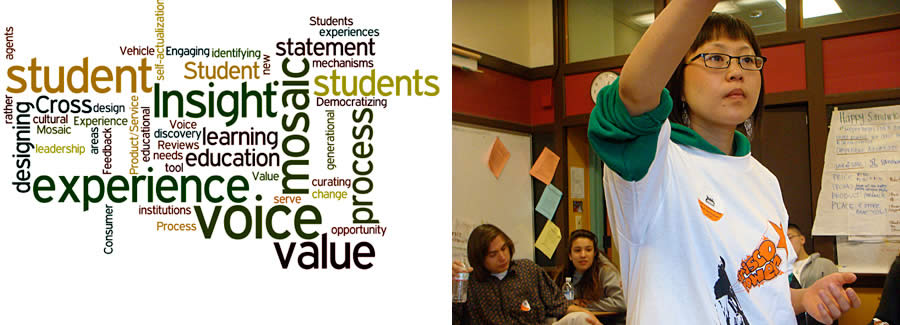
|
|---|
| Discussion Starters/Surveys |
WHEN WKCD EMBRACED STUDENT VOICE AS PART OF OUR GUIDING PRINCIPLES IN 2001, the idea that youth should be welcomed as crucial investors in improving their schools and communities had few advocates. The research on the power of student engagement was commensurately sparse.
To us, however, it made gut sense to privilege student and youth voice and vision. So for almost twelve years WKCD has supported youth as collaborators: in our books and other publications (e.g., our “Fires” series); in survey projects nationwide; in more than 75 grants to student research groups across the globe; and in the feature stories we produce for this website.
We have learned a lot about the complexities of student voice, over these years. We've learned that meaningful student voice must:
- Be inclusive, beginning with the premise that everyone has membership
- Be woven into the daily fabric of school (and reach far beyond after school clubs and "one-off" events)
- Target substantive issues
- Involve asking and listening by all parties
- Lead to constructive action.
One of the hardest challenges is to find the sweet spot between too much and too little adult participation. Too much adult involvement, and student voice loses its authenticity and its power to involve youth as true problem solvers and stakeholders. Too little, and student voice can become diffuse, exclusive, and ineffective. If young people are to be thoughtful stakeholders in improving teaching and learning, they need adult allies and mentors. And they need attentive adult listeners. It has real value for them to meet and talk without adults present. But our target at WKCD is to energize adults and youth together, in the same room, through conversations and debate
Those of us who believe in student voice have yet to make a unanimous case for why it matters. In a recent WKCD interview, Ari Sussman, who directs the Student Voice Collaborative in New York City, said:
It’s surprising how hard it’s been to convince some that student voice matters and needs to be a high priority. The link most people make is through engagement, though student voice is somewhat different than engagement, however much they are related, too.
The good news is that the academic research clearly shows that student engagement can positively affect “measurable” outcomes. Kids who take part in decision-making, who meaningfully participate in school, research shows that they're more successful in their academic endeavors, that they score better on tests, that they do better in classes, that they attend school more regularly.
But there are so many mediating factors and so many important outcomes beyond test scores that applauding the academic impact is only part of the story.
Those of us who believe in student voice try to demonstrate or explain that when students feel heard, they feel more valued, and when they feel more valued, they become more motivated to participate in school. We try to make the case that when students are listened to, they develop better relationships in school and then use those model relationships to develop good, healthy relationships outside of school.
We talk about how student voice is the beginning of the process of democratizing schools, and we remind people that if the purpose of school is to prepare young people to make change and to participate in the democracy, then walking them through that process in school increases the chances that when they leave school, they will know how to exercise democracy and believe in it.
(Read full interview, including what gets in the way of student voice.)
To view WKCD’s collection of student and youth voice, see box at top right
HAVE QUESTIONS OR COMMENTS? Please contact us at info@whatkidscndo.org.
We are deeply grateful to MetLife Foundation, Lumina Foundation for Education, the Bill & Melinda Gates Foundation, Surdna Foundation, and the Hewlett Foundation, all of whose generous support has enabled WKCD to show the power of student voice.



